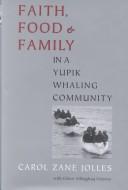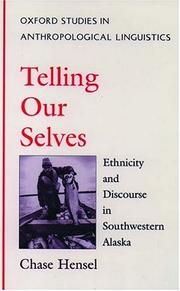| Listing 1 - 9 of 9 |
Sort by
|
Book
ISBN: 1602232172 9781602232174 9781602232167 1602232164 Year: 2013 Publisher: Fairbanks
Abstract | Keywords | Export | Availability | Bookmark
 Loading...
Loading...Choose an application
- Reference Manager
- EndNote
- RefWorks (Direct export to RefWorks)
The Siberian Yupik people have endured centuries of change and repression, starting with the Russian Cossacks in 1648 and extending into recent years. The twentieth century brought especially formidable challenges, including forced relocation by Russian authorities and a Cold War "ice curtain" that cut off the Yupik people on the mainland region of Chukotka from those on St. Lawrence Island. Yet throughout all this, the Yupik have managed to maintain their culture and identity. Igor Krupnik and Michael Chlenov spent more than thirty years studying this resilience through original fieldwor.
Yupik Eskimos --- Kuskokwagmiut Eskimos --- Kuskokwim Eskimos --- Yulugpiaq Eskimos --- Yupiak Eskimos --- Yupiaq Eskimos --- Yupiat Eskimos --- Yu'ik Eskimos --- Eskimos --- History --- Social conditions. --- Social life and customs. --- Pacific Ocean

ISBN: 0295802138 9780295802138 029598189X 9780295981895 0295981881 9780295981888 Year: 2002 Publisher: Seattle University of Washington Press
Abstract | Keywords | Export | Availability | Bookmark
 Loading...
Loading...Choose an application
- Reference Manager
- EndNote
- RefWorks (Direct export to RefWorks)
Whaling --- Yupik Eskimos --- Commercial whaling --- Hunting, Whale --- Whale fisheries --- Whale hunting --- Fisheries --- Kuskokwagmiut Eskimos --- Kuskokwim Eskimos --- Yulugpiaq Eskimos --- Yupiak Eskimos --- Yupiaq Eskimos --- Yupiat Eskimos --- Yu'ik Eskimos --- Eskimos --- Religion. --- Food
Book
ISBN: 9781607815839 1607815834 9781607815822 Year: 2017 Publisher: Salt Lake City
Abstract | Keywords | Export | Availability | Bookmark
 Loading...
Loading...Choose an application
- Reference Manager
- EndNote
- RefWorks (Direct export to RefWorks)
Yupik Eskimos --- Ethnology --- Discourse analysis, Narrative --- Narrative discourse analysis --- Narration (Rhetoric) --- Cultural anthropology --- Ethnography --- Races of man --- Social anthropology --- Anthropology --- Human beings --- Kuskokwagmiut Eskimos --- Kuskokwim Eskimos --- Yulugpiaq Eskimos --- Yupiak Eskimos --- Yupiaq Eskimos --- Yupiat Eskimos --- Yu'ik Eskimos --- Eskimos
Book
ISBN: 0295804750 9780295804750 9780295991351 0295991356 Year: 2011 Publisher: Bethel Calista Elders Council in association with University of Washington Press
Abstract | Keywords | Export | Availability | Bookmark
 Loading...
Loading...Choose an application
- Reference Manager
- EndNote
- RefWorks (Direct export to RefWorks)
Yupik languages --- Place attachment --- Geographical perception --- Yupik Eskimos --- Attachment to place --- Places, Attachment to --- Attachment behavior --- Environmental psychology --- Western Eskimo languages --- Eskimo languages --- Kuskokwagmiut Eskimos --- Kuskokwim Eskimos --- Yulugpiaq Eskimos --- Yupiak Eskimos --- Yupiaq Eskimos --- Yupiat Eskimos --- Yu'ik Eskimos --- Eskimos --- Environmental perception --- Maps, Mental --- Mental maps --- Perceptual cartography --- Perceptual maps --- Perception --- Orientation (Psychology) --- Space perception --- Social life and customs. --- History. --- Nelson Island (Alaska)
Book
ISBN: 1496211162 9781496211163 9781496204967 1496204964 9781496205162 1496205162 Year: 2018 Publisher: Lincoln
Abstract | Keywords | Export | Availability | Bookmark
 Loading...
Loading...Choose an application
- Reference Manager
- EndNote
- RefWorks (Direct export to RefWorks)
Yupik Eskimos --- Eskimo philosophy. --- Older Yupik Eskimos. --- Older people, Yupik --- Yupik older people --- Yupik aged --- Older people --- Eskimos --- Philosophy, Eskimo --- Philosophy, American --- Philosophy, Canadian --- Kuskokwagmiut Eskimos --- Kuskokwim Eskimos --- Yulugpiaq Eskimos --- Yupiak Eskimos --- Yupiaq Eskimos --- Yupiat Eskimos --- Yu'ik Eskimos --- Aged --- Philosophy
Book
ISBN: 1602231621 9781602231627 9781602231610 1602231613 Year: 2012 Publisher: Fairbanks University of Alaska Press
Abstract | Keywords | Export | Availability | Bookmark
 Loading...
Loading...Choose an application
- Reference Manager
- EndNote
- RefWorks (Direct export to RefWorks)
Mission of Change is an oral history describing various types of change-political, social, cultural, and religious-as seen through the eyes of Father Astruc and Paul Dixon, non-Natives who dedicated their lives to working with the Yup'ik people. Their stories are framed by the an analytic history of regional changes, together with current anthropological theory on the nature of cultural change and the formation of cultural identity. The book presents a subtle and emotionally moving account of the region and the roles of two men, both of whom view issues from a Catholic perspective yet.
Yupik Eskimos --- Kuskokwagmiut Eskimos --- Kuskokwim Eskimos --- Yulugpiaq Eskimos --- Yupiak Eskimos --- Yupiaq Eskimos --- Yupiat Eskimos --- Yu'ik Eskimos --- Eskimos --- Missions --- Land tenure --- Social conditions. --- Dixon, Paul --- Astruc, René, --- Jesuits --- イエズス会 --- カトリック イエズス会 --- Compagnie de Jésus --- Compañia de Jesus --- Gesellschaft Jesu --- Jesuitas --- Jesuiten --- Jesuiti --- Jezuïten --- Jésuites --- Paters Jezuïten --- Societeit van Jezus --- Society of Jesus --- Saint Mary's (Alaska) --- St. Mary's (Alaska) --- Saint Mary's, Alaska --- History. --- Social life and customs. --- Astruc, Rene,

ISBN: 1280451017 0195344677 1602566291 9780195344677 019509476X 9780195094763 9780195094770 0195094778 9786610451012 661045101X 9781602566293 9780195094763 019510255X 0195094778 0197722598 Year: 2023 Publisher: New York ; Oxford University Press,
Abstract | Keywords | Export | Availability | Bookmark
 Loading...
Loading...Choose an application
- Reference Manager
- EndNote
- RefWorks (Direct export to RefWorks)
This book examines how Yup'ik Eskimos and non-natives use talk about hunting, fishing, and processing to construct and maintain gender and ethnic identities. This book is suitable for students and scholars of linguistics and anthropology.
Yupik Eskimos --- Yupik languages --- Subsistence economy --- Cost and standard of living --- Economic anthropology --- Poverty --- Western Eskimo languages --- Eskimo languages --- Kuskokwagmiut Eskimos --- Kuskokwim Eskimos --- Yulugpiaq Eskimos --- Yupiak Eskimos --- Yupiaq Eskimos --- Yupiat Eskimos --- Yu'ik Eskimos --- Eskimos --- Social conditions. --- Ethnic identity. --- Discourse analysis, Narrative --- Ethnicity --- Gender identity --- Sex role --- Gender role --- Sex (Psychology) --- Sex differences (Psychology) --- Social role --- Gender expression --- Sexism --- Sex identity (Gender identity) --- Sexual identity (Gender identity) --- Identity (Psychology) --- Queer theory --- Ethnic identity --- Group identity --- Cultural fusion --- Multiculturalism --- Cultural pluralism --- Narrative discourse analysis --- Narration (Rhetoric) --- Social conditions --- Bethel (Alaska) --- Economic conditions. --- Bethel, Alaska --- Gender roles --- Gendered role --- Gendered roles --- Role, Gender --- Role, Gendered --- Role, Sex --- Roles, Gender --- Roles, Gendered --- Roles, Sex --- Sex roles --- Gender dysphoria
Book
ISBN: 0295804971 9780295804972 9780295991610 0295991615 Year: 2012 Publisher: Seattle Anchorage, Alaska University of Washington Press Calista Elders Council
Abstract | Keywords | Export | Availability | Bookmark
 Loading...
Loading...Choose an application
- Reference Manager
- EndNote
- RefWorks (Direct export to RefWorks)
Global environmental change. --- Climatic changes --- Ethnoecology --- Yupik Eskimos --- Environmental change, Global --- Global change, Environmental --- Global environmental changes --- Change --- Ecology --- Changes, Climatic --- Changes in climate --- Climate change --- Climate change science --- Climate changes --- Climate variations --- Climatic change --- Climatic fluctuations --- Climatic variations --- Global climate changes --- Global climatic changes --- Climatology --- Climate change mitigation --- Teleconnections (Climatology) --- Kuskokwagmiut Eskimos --- Kuskokwim Eskimos --- Yulugpiaq Eskimos --- Yupiak Eskimos --- Yupiaq Eskimos --- Yupiat Eskimos --- Yu'ik Eskimos --- Eskimos --- Indigenous peoples --- Human ecology --- Traditional ecological knowledge --- Social conditions. --- Science --- Environmental aspects --- Bering Sea Coast (Alaska) --- Environmental conditions. --- Aboriginal peoples --- Aborigines --- Adivasis --- Indigenous populations --- Native peoples --- Native races --- Ethnology --- Yupit (Inuits) --- Autochtones --- Climat --- Changement global (Environnement) --- Sciences --- Ecologie --- Changements --- Bering Sea Coast (Russia) --- Béring, Côte de la mer de (Russie) --- Environmental conditions --- Conditions environnementales --- Global environmental change
Book
ISBN: 1602232989 9781602232983 9781602232976 1602232970 Year: 2016 Publisher: Fairbanks, AK
Abstract | Keywords | Export | Availability | Bookmark
 Loading...
Loading...Choose an application
- Reference Manager
- EndNote
- RefWorks (Direct export to RefWorks)
"In October of 2010, six men who were serving on the board of the Calista Elders Council (CEC) gathered in Anchorage with CEC staff to spend three days speaking about the subsistence way of life. The men shared stories of their early years growing up on the land and harvesting through the seasons, and the dangers they encountered there. The gathering was striking for its regional breadth, as elders came from the Bering Sea coast as well as the Yukon and Kuskokwim rivers. And while their accounts had some commonalities, they also served to demonstrate the wide range of different approaches to subsistence in different regions. This book gathers the men's stories for the current generation and those to come. Taken together, they become more than simply oral histories--rather, they testify to the importance of transmitting memories and culture and of preserving knowledge of vanishing ways of life"--
Yupik Eskimos --- Subsistence farming --- Subsistence fishing --- Subsistence hunting --- Yupik languages --- Western Eskimo languages --- Eskimo languages --- Subsistence harvest of wildlife --- Subsistence use of wildlife --- Hunting --- Subsistence economy --- Wildlife utilization --- Hunting and gathering societies --- Fishery resources --- Harvesting of fishery resources, Subsistence --- Subsistence fisheries --- Subsistence harvesting of fishery resources --- Fisheries --- Fishing --- Farming, Subsistence --- Subsistence agriculture --- Subsistence harvest of farm produce --- Subsistence use of farm produce --- Agriculture --- Kuskokwagmiut Eskimos --- Kuskokwim Eskimos --- Yulugpiaq Eskimos --- Yupiak Eskimos --- Yupiaq Eskimos --- Yupiat Eskimos --- Yu'ik Eskimos --- Eskimos --- History. --- Social life and customs. --- Subsistence harvesting --- Yupik languages. --- Yupik Eskimos. --- Subsistence hunting. --- Subsistence fishing. --- Subsistence farming. --- FOREIGN LANGUAGE STUDY --- SOCIAL SCIENCE --- Native American Languages. --- Anthropology --- General. --- Alaska. --- Behavioral sciences --- Human sciences --- Sciences, Social --- Social science --- Social studies --- Civilization --- Foreign language study --- Language and education --- Language schools --- Â-lâ-sṳ̂-kâ --- AK --- Alaasika --- ʻĀlaka --- Alasca --- Alasijia --- Alasijia Zhou --- Alaska Eyâleti --- Alaska osariik --- Alaska Territory --- Alasḳah --- Alasko --- Alaszka --- Ali︠a︡sk --- Ali︠a︡ska --- Aljaška --- Allaesŭkʻa --- Allaesŭkʻa-ju --- Allaesŭkʻaju --- Alyaska --- Alyaska Shitati --- Arasuka --- Arasuka-shū --- Arasukashū --- Civitas Alascae --- Estado de Alaska --- Estado ng Alaska --- Hakʼaz Dineʼé Bikéyah Hahoodzo --- Medinat Alasḳah --- Politeia tēs Alaska --- Russian America --- Russkai︠a︡ Amerika --- Shtat Ali︠a︡ska --- State of Alaska --- Statul Alaska --- Territory of Alaska --- Πολιτεία της Αλάσκα --- Αλάσκα --- Аљаска --- Аляск --- Аляска --- Алјаска --- Русская Америка --- Штат Аляска --- אלאסקע --- אלסקה --- מדינת אלסקה --- アラスカ --- アラスカ州 --- 阿拉斯加 --- 阿拉斯加州 --- 알래스카 --- 알래스카 주 --- 알래스카주 --- Language and languages --- Study and teaching --- Foreign speakers --- Â-lâ-sṳ̂-k --- Ali͡ask --- Ali͡aska --- Arasuka-sh --- Arasukash --- Russkai͡a Amerika --- Shtat Ali͡aska
| Listing 1 - 9 of 9 |
Sort by
|

 Search
Search Feedback
Feedback About UniCat
About UniCat  Help
Help News
News